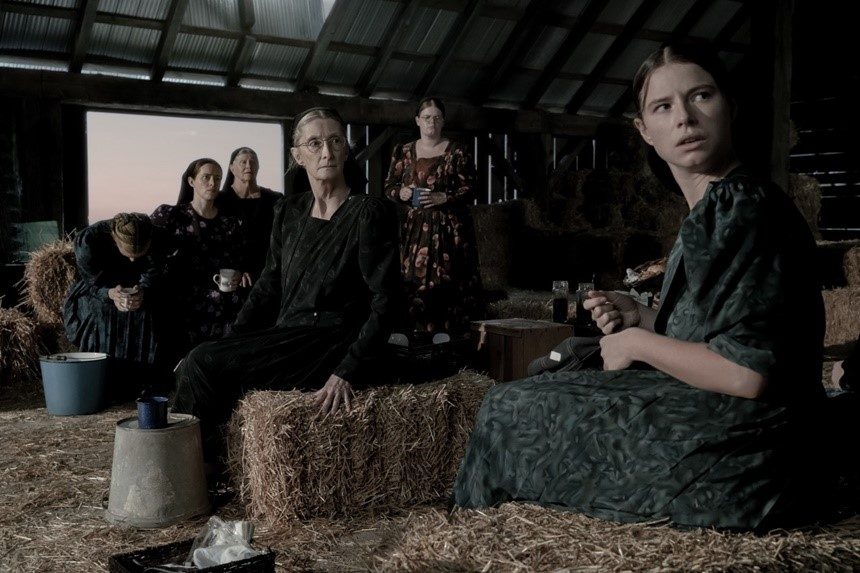Women Talking
⭐️ ⭐️ ⭐️⭐️
Rating: PG-13
Run Time: 1 hour 44 minutes
Stars: Rooney Mara, Claire Foy, Jessie Buckley, Frances McDormand, Judith Ivey, Ben Whishaw
Writers: Sarah Polley, Miriam Toews
Director: Sarah Polley
Reviewed at the Toronto International Film Festival
Were there an Oscar category for Truth in Advertising, this year’s award would most certainly go to Women Talking, a film that does little more than focus on the faces of its characters and listen to their words — yet somehow creates as compelling a cinematic experience as you’ll have this year.
Based on a true story, the film opens as many of the females of a remote Mennonite community — women and girls alike — convene to decide whether or not to leave the micro society that has always dictated their living conditions.
Until this moment, all of them have willingly subjected themselves to subhuman conditions: Utterly under control of the menfolk, they have fewer rights than the agrarian community’s farm animals. Convinced their subservient role is a Biblical mandate, they have put up with it for generations — but now the unconscionable has occurred: Several of the men have been caught drugging the women and girls and raping them. When the victims awake the next morning, confused and bloody, the leaders have dismissed them as either delusional or victims of a satanic attack that is, in some way, their fault.
Writer/director Sarah Polley (Away from Her) ushers us through those preliminaries with admirable dispatch. It’s not the crime, but the women that matter to her. Within minutes we are in the upper level of the commune’s expansive barn, sitting in a circle with three generations of women — eight of them — witnessing their anger, their confusion, their hatred, their resignation. But most of all, Women Talking bears witness to the women’s courage as, after decades of willing subjugation, they begin to flirt with the notion that maybe, just maybe, they possess human worth equal to that of the men they live with.
At one end of the spectrum is stoic Janz, known as “Scarface” for her mutilated cheek. There is no doubt her wound came from a violent husband — yet she remains steadfast in her insistence that the women should stay put, hope and pray that the men will mend their ways. She is played by the wonderful Frances McDormand (also one of the film’s producers), perhaps the only screen actor who could help us understand that dynamic that causes a woman to remain in a brutally abusive relationship.
Others, played with heartbreaking earnestness by an all-star ensemble including the inestimable Rooney Mara, Claire Foy, Jessie Buckley and Judith Ivey, take varying positions of resistance: Some want to stay and resist the men’s aggressive form of authority; others want to pack up, take the children, and leave forever.
For a surprisingly brisk hour and 45 minutes, Polley places us in the midst of this group, eavesdropping as they verbalize, many of them for the first time, the levels of congenital anguish they share. Polley enlists none of the cinematic tricks a lesser director might have used to lend dynamism to such a static premise — no oddball angles, no breakneck camera swoops from one character to the next. When a woman speaks, the camera lavishes its attention on her; on her face, on her newfound defiant voice, on her twin torments of staying in a temporal Hell or risking, as the men have repeatedly warned her, the fires of everlasting Hades for the sin of disobedience.
Compounding the women’s dilemma is the fear of setting off into the unknown; none of them have ever been allowed so much as a glimpse of a map.
Every so often, as we observe these women whose conditions echo some bygone agrarian age, Polley presents us with a startling reminder of the time period: A census taker arrives about halfway through, asking the community members to participate in the 2010 count (naturally, they politely refuse).
While Women Talking’s time frame is clear, Polley seems intent on diffusing our sense of where the story is unfolding. Canadian novelist Miriam Toews based her story on an actual 2011 case at a Mennonite community in Bolivia. The film seems to unfold in North America, yet when the women’s sole male ally, a college-educated teacher named August (sweet-faced Ben Whishaw) counsels them on a manner of escape, he advises them to navigate not by the North Star, but by the Southern Cross, which is barely visible north of South Florida.
The minimization and abuse of women, Polley seems to be telling us, is not a phenomenon defined by era or geography. Nor, her masterful film reminds us, is a “movie” defined by rapid-fire edits or explosive conflict.
Become a Saturday Evening Post member and enjoy unlimited access. Subscribe now



